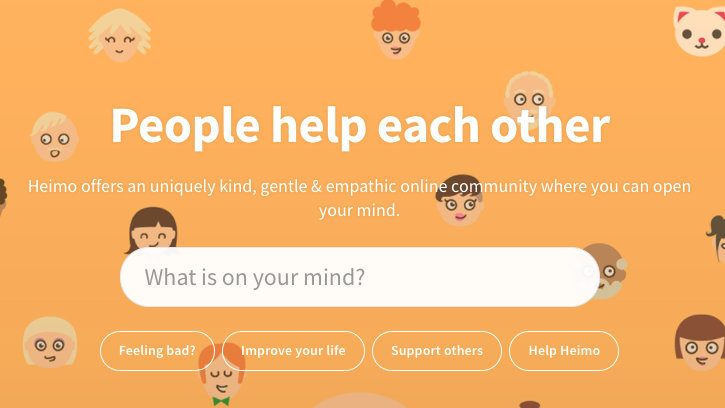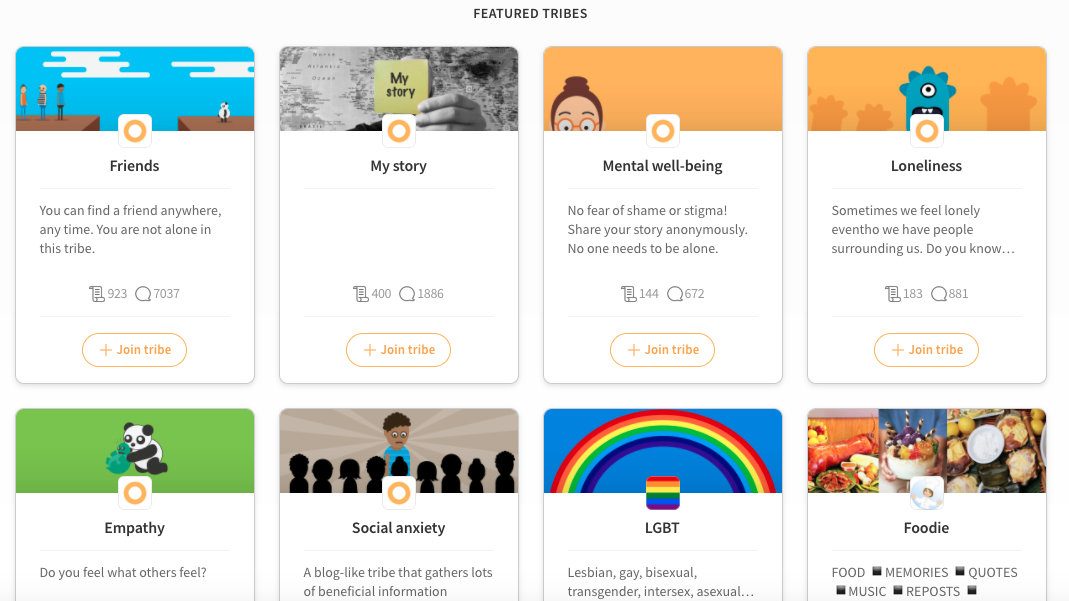SUMMARY
This is AI generated summarization, which may have errors. For context, always refer to the full article.

MANILA, Philippines – There are some matters that aren’t always easy to talk about. Difficult experiences, loneliness, depression, sexual identity – they’re not something the regular person will blurt out at the family dinner or a gathering with friends. On most social networks, it’s even more difficult. On Facebook, Instagram, or Twitter, it’s the happy moments that mostly take center stage, with social media feeds being a highlight reel of sorts for people.
But as most netizens know by now, what we see on social media doesn’t always show the entire picture. People have their trying moments, but most major social networks just aren’t an apt venue for talking about these issues in detail. Or at least this is what Heimo, a made-in-Finland social network, believes to have identified when it launched the website (heimo.co) last March.
Heimo is a social network focused on building an online community that listens to one another’s problems and one that encourages people to speak up. “People help each other,” the site’s slogan goes.
On the site, people can sign up and write stories about the challenges they’re facing. Once written, the user picks what the site calls a “tribe” on which their story will appear. Think of the tribe as a hashtag or categories under which stories are filed. The most populated tribes, says the site’s head of Asia Teemu Kainulainen, are “loneliness,” “depression,” “bullying,” “school and work stress,” “relationships,” “sexual identity,” and “LGBT.”
In each tribe, users are free to speak up on the topic, and receive support from people experiencing similar difficulties. Heimo, at its core, is an online forum that’s designed like a modern social media site, tackling topics that today’s social media user would normally avoid tackling.

Big Philippine audience
While the site is globally accessible, it’s interesting to note that 80% of its users are Filipinos. The site has amassed a total of 100,000 users since its launch – 80,000 of whom are Filipinos, making the Philippines the key market for Heimo.
Scan through the pages, and you can see that there is indeed a big Filipino presence on the site, some of them talking in the native language.
What’s with Filipinos flocking to the site? Kainulainen, crediting insights from within the Heimo team, cites a few reasons: “Filipinos are naturally very active on the internet, and culturally, are very social and have the genuine will to help strangers.”
Another reason: the site has an anonymous environment. Naturally, it helps encourage people to share their difficult stories.
But shouldn’t the goal be to remove the stigma attached to certain topics by being brave enough to talk about it non-anonymously? The Heimo exec agreed but also stressed that what Heimo is offering is a first step to actually talking about it. He explained that difficult times can cause people to close themselves off and stop talking about matters completely.
In Heimo, the anonymous setup gently coaxes people to come out of their shell again, knowing that they can share a problem without being identified and knowing that they’re sharing a problem to a community facing similar issues.
The hope is that with the constant practice of opening up online, eventually they will be able to talk more openly to other people, face to face. Users can also choose to show their real selves when they decide they want to.
Maintaining the community
Won’t the anonymity cause the trolls to come in droves? Surprisingly, Kainulainen said it hasn’t. While it hasn’t been a year since the site launched, he proudly proclaimed that there’s only been one trolling incident. They’re a troll-free social network, which further encourages people to just open up.
Kainulainen suggested that because Heimo publicly declares its goals of being a help center for people, it is able to ward off the negativity and the online abuse so common in other bigger sites. He added that the current crop of users is currently very engaged, leaving little room for vitriolic online behavior. One of the goals for the company should be to keep it that way, should the numbers grow.
While one can just as easily search online for self-help articles or answers from netizens on whatever personal issue, the proposed appeal of Heimo is that it has a real, caring community as opposed to the impersonality of the wider web.
How does Heimo plan to maintain the friendly community? The people behind the site want to eventually take the act offline by providing real-world mentoring and support for the people who truly need it. Right now, they’re looking to open an office in the Philippines in order to foster the young online community better – and because, as mentioned, the country has the largest Heimo user base in the world.
Once they’ve opened shop here, they plan to pursue partnerships with local non-governmental organizations and charity groups who can provide enhanced support for Heimo users. They’re also planning to set up a “Mentor Program” where the site’s most active users can offer one-on-one sessions with other members.
Heimo is a very young community but the proposed programs – the combination of an online peer-to-peer support group with offline face-to-face encounters – might eventually make it a valuable tool for the troubled among us or an option for people to let out some steam. – Rappler.com
Add a comment
How does this make you feel?
There are no comments yet. Add your comment to start the conversation.